Welcome to Issue 82 of the SUPERIOR BOOK PRODUCTIONS newsletter!
Hello, Everyone!
I hope you are all hanging in there during this coronavirus pandemic. I feel fortunate to work from home anyway, but I have to admit that now that spring is here, I would like to be out and about more. Still, I’ve done plenty of traveling through some wonderful books lately.
Please take advantage of this time to catch up on your reading. This month, as always, we have some great books to offer, including the winner of this year’s Tyler R. Tichelaar Historical Fiction Award sponsored through the annual Reader Views Literary Awards.
May you and your loved ones be healthy and safe. My prayers and best wishes are with you all.
Tyler
This Month’s Great Book Quote:
“I have never known any distress that an hour’s reading did not relieve.”
— Montesquieu
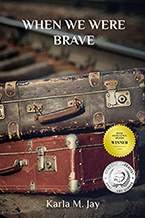 This year, the winner of the Tyler R. Tichelaar Best Historical Fiction Award goes to Karla M. Jay’s When We Were Brave. It is truly one of the finest novels to win the award in the ten years I have been sponsoring it. I found myself completely engrossed in the characters and learning some unsavory new details about World War II.
This year, the winner of the Tyler R. Tichelaar Best Historical Fiction Award goes to Karla M. Jay’s When We Were Brave. It is truly one of the finest novels to win the award in the ten years I have been sponsoring it. I found myself completely engrossed in the characters and learning some unsavory new details about World War II.
When We Were Brave takes readers into the middle of World War II and the motivations behind why people make different decisions to protect human lives. Jay’s weaving together of three separate stories keeps the reader continually interested in the characters and events. Short chapters continually move the story forward until all the characters are brought together in a shocking but satisfying conclusion.
The most remarkable story is probably that of Wilhelm Falk. Falk is a German and a member of the SS; however, he only joined the SS because he was recruited by other members who were plotting to bring down Hitler. After several failed assassination attempts by the SS, Falk finds himself in Italy in November 1943, when the novel opens. He now decides to put on the clothes of a dead German soldier of lower rank so he can be taken prisoner and sent to the U.S. Once there, he intends to tell people what he knows about Hitler’s forces and open the world’s eyes to the atrocities of the concentration camps he has witnessed.
To read more, visit When We Were Brave.
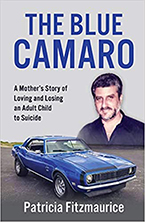 Patricia Fitzmaurice’s new book The Blue Camaro is a memoir about raising, loving, and ultimately, losing her son. In 2013, her son John Fitzmaurice, Jr. took his own life. Now at age eighty-seven, Patricia is fulfilling her promise to her son to tell his story so that others might understand what it is like to lose a child to suicide and what his journey must have been like that it led him to that decision.
Patricia Fitzmaurice’s new book The Blue Camaro is a memoir about raising, loving, and ultimately, losing her son. In 2013, her son John Fitzmaurice, Jr. took his own life. Now at age eighty-seven, Patricia is fulfilling her promise to her son to tell his story so that others might understand what it is like to lose a child to suicide and what his journey must have been like that it led him to that decision.
The Blue Camaro offers no easy answers because there are none. To this day, Patricia still wonders what caused her son to kill himself. She documents in this book the story of John’s childhood, including their family’s many moves to various places from Pennsylvania to Connecticut to Florida, the birth of his sisters, his love for his dog, his difficulty in making friends, his entrepreneurial efforts from a young age, and how he saved up money to buy his first car: a Blue Camaro.
The book’s title reflects what may have been the happiest time in John’s life. His new car was a prized possession for him as a young man, and it also made him popular. For the first time, John seemed to be truly happy. If only things could have stayed that way.
To read more, visit The Blue Camaro.
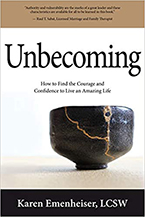 In Unbecoming, Karen Emenheiser’s down-to-earth, honest, and bold perspective on life sheds light on how we all have our faults and flaws, but through God’s grace, we are also all worthy. Like all of us, Karen has struggled with feelings of doubt and shame, but over time, she has become “determined to be unapologetically me while I walk closely with God toward becoming the best version of me.”
In Unbecoming, Karen Emenheiser’s down-to-earth, honest, and bold perspective on life sheds light on how we all have our faults and flaws, but through God’s grace, we are also all worthy. Like all of us, Karen has struggled with feelings of doubt and shame, but over time, she has become “determined to be unapologetically me while I walk closely with God toward becoming the best version of me.”
Karen did not set out to write a Christian book, and that’s not really what Unbecoming is, but it’s important to understand the basis behind it. One night after Karen lost her temper and cried to God in frustration, a realization hit her like a bolt of lightning right in her heart. Then a voice popped into her brain that said, “My Grace is sufficient for thee.” She realized then, “It was God’s mercy and love letting me off the hook. Not a ‘try harder,’ not a ‘hang in there; you’ll get it.’ But a genuine, ‘You are off the hook.’”
Once Karen had this realization, life became a little easier for her. She learned how to focus on behaviors to keep her triggers from being united—triggers that come from past traumatic experiences.
To read more, visit Unbecoming.
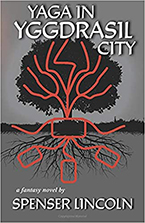 Spenser Lincoln’s debut novel Yaga in Yggdrasil City is an eclectic mix of fantasy, mythology, urban fiction, bildungsroman, romance, and adventure. I’ve never read a book quite like it. E. M. Forster wrote in Aspects of the Novel, “Expansion. That is the idea the novelist must cling to. Not completion. Not rounding off, but opening out.” Spenser Lincoln has embodied that idea in his novel, showing us a complex world that we only get glimpses of. Reading this novel is like visiting a foreign country where we come away with only a limited understanding of the people, but have fallen in love with it and want to go on to explore it again and again.
Spenser Lincoln’s debut novel Yaga in Yggdrasil City is an eclectic mix of fantasy, mythology, urban fiction, bildungsroman, romance, and adventure. I’ve never read a book quite like it. E. M. Forster wrote in Aspects of the Novel, “Expansion. That is the idea the novelist must cling to. Not completion. Not rounding off, but opening out.” Spenser Lincoln has embodied that idea in his novel, showing us a complex world that we only get glimpses of. Reading this novel is like visiting a foreign country where we come away with only a limited understanding of the people, but have fallen in love with it and want to go on to explore it again and again.
The novel opens when Yaga and his two high school companions, George and Audhild, defeat a lich who is threatening their world. The prologue details this pivotal scene around which is built everything that follows. Then, in Chapter 1, we jump ahead four years to when Yaga is in college with his younger girlfriend Simone. We follow Yaga’s daily activities, from flying to school in autumn and shoveling sidewalks for money in winter, to coping with how to use his first cellphone and helping his girlfriend make potions. Yes, they attend a college that teaches magic—but this book is no Harry Potter story. Instead, it’s a tale of angst as Yaga continually struggles with his past and whom he wants to be in his present.
To read more, visit Yaga in Yggdrassil City.
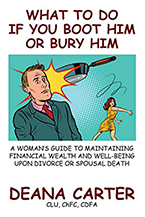 When Prince Charming arrives and you actually marry him, the last thing you want to think about is that he might drop dead, or, perhaps worse, turn into an ogre. However, millions of women have had one or both experiences. Deana Carter Ingalls is here to help you when your fairy tale turns into a nightmare. In her new book What to Do If You Boot Him or Bury Him, she offers practical, realistic, sensible, and financial advice on what to do now so you are not caught unprepared if your husband dies or if you end up getting a divorce.
When Prince Charming arrives and you actually marry him, the last thing you want to think about is that he might drop dead, or, perhaps worse, turn into an ogre. However, millions of women have had one or both experiences. Deana Carter Ingalls is here to help you when your fairy tale turns into a nightmare. In her new book What to Do If You Boot Him or Bury Him, she offers practical, realistic, sensible, and financial advice on what to do now so you are not caught unprepared if your husband dies or if you end up getting a divorce.
Deana, a longtime Charter Life Underwriter (CLU), Charter Financial Consultant (ChFC), and Certified Divorce Financial Analyst (CDFA), begins by sharing a few facts in case you believe being divorced or widowed is something you don’t need to worry about. According to the 2010 U.S. Census, America has the tenth highest divorce rate in the world: 53%. That equates to one divorce every six seconds. Furthermore, because many married women are not prepared for divorce or their spouse’s death, they do not have the assets or financial know-how to stay ahead of the game. The National Institute on Retirement Security reports that 80% of women are likely to fall into poverty in their retirement years.
To read more, visit What to Do If You Boot Him or Bury Him.
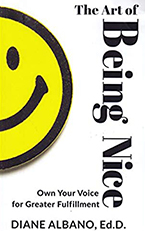 Long ago, I learned that one of the most important things we can do when faced with a difficult situation is to “Say what you mean and mean what you say, but don’t be mean when you say it.” Diane Albano’s The Art of Being Nice: Own Your Voice for Greater Power and Fulfillment takes that kind of advice and elaborates upon all the places where things might go wrong as we walk the fine line between being nice and standing up for ourselves.
Long ago, I learned that one of the most important things we can do when faced with a difficult situation is to “Say what you mean and mean what you say, but don’t be mean when you say it.” Diane Albano’s The Art of Being Nice: Own Your Voice for Greater Power and Fulfillment takes that kind of advice and elaborates upon all the places where things might go wrong as we walk the fine line between being nice and standing up for ourselves.
And Diane knows what it means to be too nice and let people walk all over you. In The Art of Being Nice’s pages, she shares stories from her own life about how she learned to find her voice. She has also interviewed numerous women and men who shared their stories with her. As she notes early on, “We all experienced the imprinted message of ‘being nice’ as children and the power, pitfalls, and impact it had upon us into adulthood. I’ve written this book for women and men who can identify with life patterns of compromising their truth, their God-given talent and abilities, and minimizing the power of owning their voices for greater freedom and fulfillment.” If you’ve ever felt like being nice has often brought you misery, this is the book you need to turn things around.
To read more, visit The Art of Being Nice.
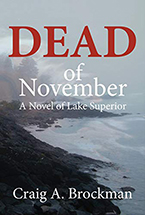 Craig A. Brockman’s Dead of November is a supernatural thriller that will leave readers entranced by its Native American lore, ghostly apparitions, exotic location, and homage to lost love. Set in Sault Sainte Marie, Michigan, one of the oldest cities in the Midwest on the shore of Lake Superior, the novel draws upon the city’s historical heritage as a former gathering place of Native Americans at the St. Mary’s Rapids, later the site of Fort Brady, and today home to the Soo Locks and a Native American-owned casino. All these places figure into the story, mixing the past with the present in a whirlpool of confusion about what is real, what is legend, and what results when the two merge into a new reality.
Craig A. Brockman’s Dead of November is a supernatural thriller that will leave readers entranced by its Native American lore, ghostly apparitions, exotic location, and homage to lost love. Set in Sault Sainte Marie, Michigan, one of the oldest cities in the Midwest on the shore of Lake Superior, the novel draws upon the city’s historical heritage as a former gathering place of Native Americans at the St. Mary’s Rapids, later the site of Fort Brady, and today home to the Soo Locks and a Native American-owned casino. All these places figure into the story, mixing the past with the present in a whirlpool of confusion about what is real, what is legend, and what results when the two merge into a new reality.
The story begins when Adam Knowles, a psychiatrist practicing in Lower Michigan, is asked by his old colleague, Ron, to return to Sault Sainte Marie to help at the clinic there. Adam goes out of obligation, although he knows it will mean facing his difficult past—one in which the love of his life was drowned, and one where he gained a reputation in the town for helping people who believed they were seeing ghosts. Little does Adam know people are seeing ghosts again, which is why Ron wants him to return.
To read more, visit Dead of November.

